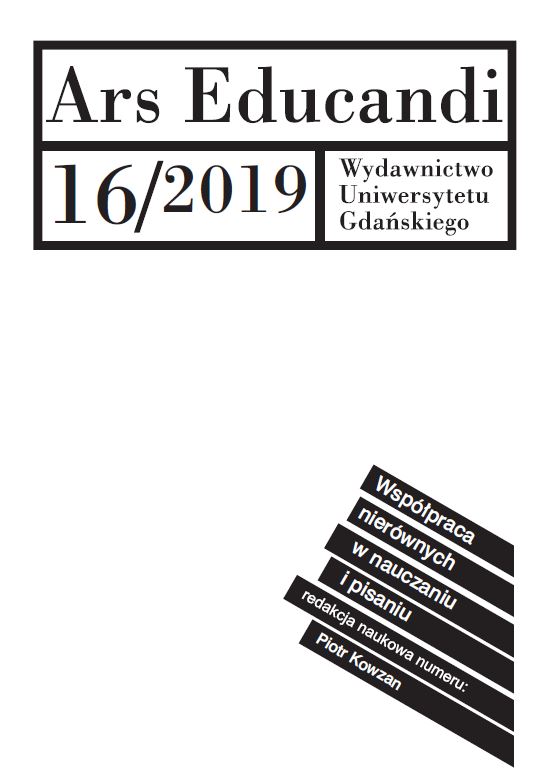Zmiksowani(e) i dydaktyczne stawanie się
DOI:
https://doi.org/10.26881/ae.2019.16.04Słowa kluczowe:
Rutkowiak, edukacja, opowieści, kakotopiaAbstrakt
W swojej odpowiedzi na artykuł Joanny Rutkowiak autor podkreśla życiodajny dla teorii status praktyki pedagogicznej. Zwraca się ku antropologicznym drogom rejestrowania praktyk pedagogicznych, które podkreślają wydarzeniowy i kakotopiczny charakter tych ostatnich.
Downloads
Bibliografia
Agamben G. (2018) Idea prozy, Warszawa: Fundacja Augusta Hrabiego Cieszkowskiego.
Badley, G. F. (2018). Why and How Academics Write, “Qualitative Inquiry”, https://doi.org/10.1177/1077800418810722.
Bergson, H. (2004) Ewolucja twórcza, Wydawnictwo Zielona Sowa, Kraków.
Block A. A. (2017) Study as Scared [w:] C. W. Ruitenberg (red.), Reconceptualizing Study in Educational Discourse and Practice, Nowy Jork, Londyn: Routledge.
Bochner A.P. i Ellis C. (2016) The ICQI and the Rise of Autoethnography. Solidarity Through Community, International Review of Qualitative Research 9(2).
Campbell, E. (2018). Rekonstructing my identity: An autoethnographic exploration of depression and anxiety in academia. Journal of Organizational Ethnography, 7(3).
Deleuze D. (2016), Krytyka i klinika, Łódź: Wydawnictwo Officyna.
Denzin N. K. (2003a) The Call to Performance, Symbolic Interaction 26(1).
Denzin N.K. (2003b) Reading and writing performance, Qualitative Research 3(2).
Denzin, N. K. (2009) Qualitative inquiry under fire: Toward a New Paradigm Dialogue, Left Coast Press.
D'Hoest, F., Lewis, T. E. (2015) Exhausting the fatigue university: in search of a biopolitics of research, Ethics and Education 10(1).
Ellis C., Adams T. E., Bochner A. P. (2010) Autoethnography: An Overview [40 paragraphs]. Forum Qualitative Sozialforschung / Forum: Qualitative Social Research 12(1), Art. 10, http://nbn-resolving.de/urn:nbn:de:0114-fqs1101108.
Gale K. (2016) Writing Minor Literature. Working With Flows, intensities and the Welcome of the Unknown, Qualitative Inquiry” 22(5).
Gale, K i Wyatt, J. (2017). Working at the Wonder: Collaborative Writing as Method of Inquiry. Qualitative Inquiry, 23(5).
Gale, K., Pelias, R., Russell L., Spry T., Wyatt J. (2013). Intensity. A Collaborative Autoethnography, International Review of Qualitative Research, 6(1).
Grant, A., Short, P. N. i Turner, L. (2013). Introduction: Storying Life and Lives. In N. P. Short, L. Turner & A. Grant (Eds.), Contemporary British Autoethnography. Rotterdam: Sense Publisher.
Gurevitch Z. (2000) The Serious Play of Writing, Qualitative Inquiry 6(1).
Guttorm, H. E. (2012) Becoming - (a) - paper, or an article undone: (Post-)knowing and writing (again), nomadic and so messy. Qualitative Inquiry, 18(7).
Kaczmarczyk, P., Madys, A., Pławski, M., Szczepaniak C., O. Szwabowski, Wężniejewska P. (w druku): Kolektywne majsterkowanie, albo zmiana, która nie-nadchodzi [w:] A. Kacperczyk, M. Kafar (red.), Autoetnografia – stan współczesny w Polsce i perspektywy rozwoju, t. 4, Łódź: Wydawnictwo Uniwersytetu Łódzkiego.
Klus-Stańska D. (2010) Dydaktyka wobec chaosu pojęć i zdarzeń, Warszawa: Wydawnictwo Akademickie „Żak”.
Klus-Stańska, D. (2018) Paradygmaty dydaktyki, Warszawa: PWN.
Majka R. (2019). Teraźniejsze przyszłości. Współczesne wyobrażenie lewicowe, , Gdańsk: WN Katedra.
McKinght, L., Bullock, O., i Todd, R. (2017). Whiteout: Writing collaborative online poetry as inquiry. Qualitative Inquiry, 23(4).
Miéville, Ch. (2009). Żelazna Rada, Poznań: Zysk i sk-a.
Moe, M. I Reinertsen, A. B. (2019). Poeticalization and Storying; www.mmm.com. Qualitative Inquiry, 25(7).
Moreira, C. (2014). I hate chicken breast: a tale of resisting stories and disembodied knowledge construction. International Journal of Qualitative Studies in Education, 25(2).
Morrissey, D. (2014). An autoethnographic inquiry into the role of serendipity in becoming a teacher educator/researcher. International Journal of Qualitative Studies in Education, 27(7).
Pelias R. J. (2005) Performative Writing as Scholarship: An Apology, an Argument, an Anecdote, Cultural Studies Critical Methodologies 5(4).
Pelias R. J. (2017). Still Here, Writing, trying to Be a Part of the Conversation, Cultural Studies Critical Methodologies 17(4).
Pensoneau-Conway, SL., Bolen, D. M., Toyosaki, S., Rudick, C. K. & Bolen, E. K. (2014). Self, relationship, positionality, and politics: A community autoethnographic inquiry into collaborative writing. Cultural Studies ↔ Critical Methodologies, 14(4)
Pławski M., Szwabowski O., Szczepaniak C., Wężniejewska P. (2019) Friendly Writing as Non- inquiry: The Problems of Collective Autothnographic Writing About Collective Autoethnographic Writing, Qualitative Inquiry,25(9-10)
Pollock, D. (2007). The Performative I. Cultural Studies Critical Methodologies, 7(3).
Richardson L. (2002) Writing Sociology, Cultural Studies Critical Methodologies 2(3).
Speedy, J. (2012). Collaborative writing and ethical know-how movements within the space around scholarship, the academy and the social research imaginary. International Review of Qualitative Research, 5(4).
Spry T. (2016) Autoethnography and the Other. Unsettling Power through Utopian Performatives, Nowy Jork: Routledge.
St. Pierre E. A. (1997) Circling the Text: Nomadic Writing Practices, Qualitative Inquiry 3(4).
Szwabowski O. (2018). Dydaktyka przeciwko dydaktyce. Kultura – Społeczeństwo – Edukacja nr 2(14).
Szwabowski O., Wężniejewska P. (2017) An (co)autoethnographic story about going against the neoliberal didactic machine? , Journal for Critical Education Policy Studies 15(3)
Szwabowski, O. (2014) Paradygmat i pedagogika, Hybris, 25.
Szwabowski, O. (2019) Nekrofilna produkcja akademicka i pieśni partyzantów, Wrocław: Wydawnictwo Instytutu Pedagogiki Uniwersytetu Wrocławskiego.
Waite, D. (2014) Teaching the Unteachable: Some Issues of Qualitative Research Pedagogy, Qualitative Inquiry 20 (3).
Wężniejewska P., Szwabowski O., Szczepaniak C., Pławski M. (2019). The Praise of Collective Autoethnography. Cultural Studies↔ Critical Methodologies, doi: 1532708619863447.

 Uniwersyteckie Czasopisma Naukowe
Uniwersyteckie Czasopisma Naukowe




